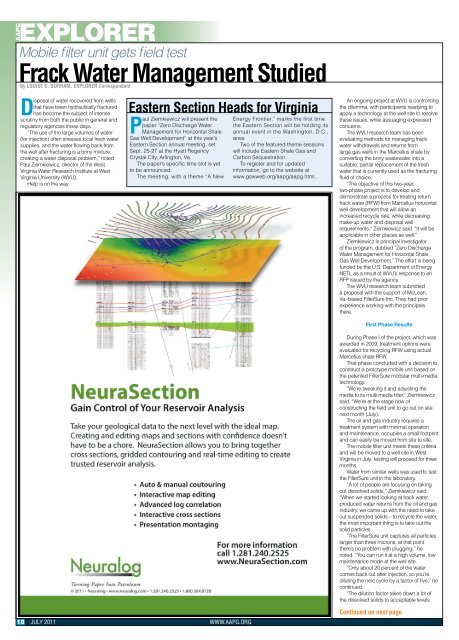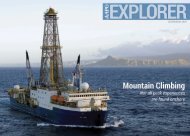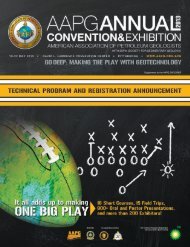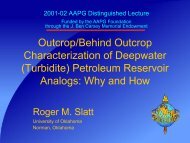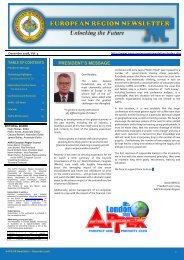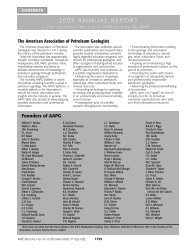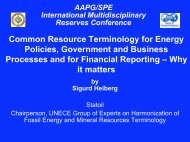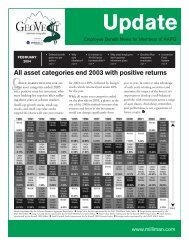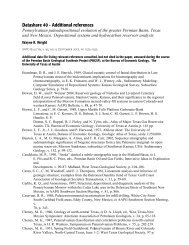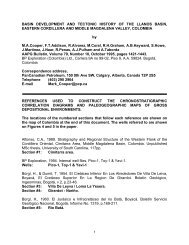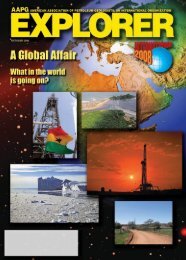AAPG Explorer - American Association of Petroleum Geologists
AAPG Explorer - American Association of Petroleum Geologists
AAPG Explorer - American Association of Petroleum Geologists
You also want an ePaper? Increase the reach of your titles
YUMPU automatically turns print PDFs into web optimized ePapers that Google loves.
<strong>AAPG</strong><br />
EXPLORER<br />
Mobile filter unit gets field test<br />
Frack Water Management Studied<br />
By LOUISE S. DURHAM, EXPLORER Correspondent<br />
Disposal <strong>of</strong> water recovered from wells<br />
that have been hydraulically fractured<br />
has become the subject <strong>of</strong> intense<br />
scrutiny from both the public in general and<br />
regulatory agencies these days.<br />
“The use <strong>of</strong> the large volumes <strong>of</strong> water<br />
(for injection) <strong>of</strong>ten stresses local fresh water<br />
supplies, and the water flowing back from<br />
the well after fracturing is a briny mixture,<br />
creating a water disposal problem,” noted<br />
Paul Ziemkiewicz, director <strong>of</strong> the West<br />
Virginia Water Research Institute at West<br />
Virginia University (WVU).<br />
Help is on the way.<br />
Eastern Section Heads for Virginia<br />
Paul Ziemkiewicz will present the<br />
paper “Zero Discharge Water<br />
Management for Horizontal Shale<br />
Gas Well Development” at this year’s<br />
Eastern Section annual meeting, set<br />
Sept. 25-27 at the Hyatt Regency<br />
Crystal City, Arlington, Va.<br />
The paper’s specific time slot is yet<br />
to be announced.<br />
The meeting, with a theme “A New<br />
18 JULY 2011 WWW.<strong>AAPG</strong>.ORG<br />
Energy Frontier,” marks the first time<br />
the Eastern Section will be holding its<br />
annual event in the Washington, D.C.,<br />
area.<br />
Two <strong>of</strong> the featured theme sessions<br />
will include Eastern Shale Gas and<br />
Carbon Sequestration.<br />
To register and for updated<br />
information, go to the website at<br />
www.gswweb.org/aapg/aapg.html.<br />
An ongoing project at WVU is confronting<br />
the dilemma, with participants readying to<br />
apply a technology at the well site to resolve<br />
these issues, while assuaging expressed<br />
concerns.<br />
The WVU research team has been<br />
evaluating methods for managing frack<br />
water withdrawals and returns from<br />
large gas wells in the Marcellus shale by<br />
converting the briny wastewater into a<br />
suitable, partial replacement <strong>of</strong> the fresh<br />
water that is currently used as the fracturing<br />
fluid <strong>of</strong> choice.<br />
“The objective <strong>of</strong> this two-year,<br />
two-phase project is to develop and<br />
demonstrate a process for treating return<br />
frack water (RFW) from Marcellus horizontal<br />
well development that will allow an<br />
increased recycle rate, while decreasing<br />
make-up water and disposal well<br />
requirements,” Ziemkiewicz said. “It will be<br />
applicable in other places as well.”<br />
Ziemkiewicz is principal investigator<br />
<strong>of</strong> the program, dubbed “Zero Discharge<br />
Water Management for Horizontal Shale<br />
Gas Well Development.” The effort is being<br />
funded by the U.S. Department <strong>of</strong> Energy<br />
NETL as a result <strong>of</strong> WVU’s response to an<br />
RFP issued by the agency.<br />
The WVU research team submitted<br />
a proposal with the support <strong>of</strong> McLean,<br />
Va.-based FilterSure Inc. They had prior<br />
experience working with the principals<br />
there.<br />
First Phase Results<br />
During Phase I <strong>of</strong> the project, which was<br />
awarded in 2009, treatment options were<br />
evaluated for recycling RFW using actual<br />
Marcellus shale RFW.<br />
That phase concluded with a decision to<br />
construct a prototype mobile unit based on<br />
the patented FilterSure modular multi-media<br />
technology.<br />
“We’re tweaking it and adjusting the<br />
media to its multi-media filter,” Ziemkiewicz<br />
said. “We’re at the stage now <strong>of</strong><br />
constructing the field unit to go out on site<br />
next month (July).<br />
The oil and gas industry requires a<br />
treatment system with minimal operation<br />
and maintenance, occupies a small footprint<br />
and can easily be moved from site to site.<br />
The mobile filter unit meets these criteria<br />
and will be moved to a well site in West<br />
Virginia in July; testing will proceed for three<br />
months.<br />
Water from similar wells was used to test<br />
the FilterSure unit in the laboratory.<br />
“A lot <strong>of</strong> people are focusing on taking<br />
out dissolved solids,” Ziemkiewicz said.<br />
“When we started looking at frack water,<br />
produced water returns from the oil and gas<br />
industry, we came up with the need to take<br />
out suspended solids – to recycle the water,<br />
the most important thing is to take out the<br />
solid particles.<br />
“The FilterSure unit captures all particles<br />
larger than three microns; at that point<br />
there’s no problem with plugging,” he<br />
noted. “You can run it at a high volume, low<br />
maintenance mode at the well site.<br />
“Only about 20 percent <strong>of</strong> the water<br />
comes back out after injection, so you’re<br />
diluting the next cycle by a factor <strong>of</strong> five,” he<br />
continued.<br />
“The dilution factor takes down a lot <strong>of</strong><br />
the dissolved solids to acceptable levels<br />
Continued on next page


